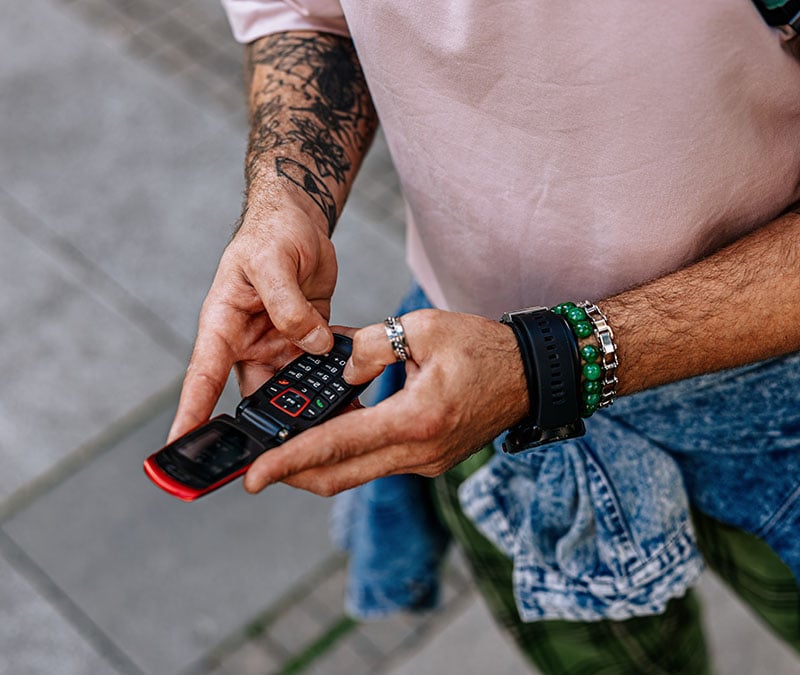Apple’s AirTag: You might never lose your keys again – but what about your privacy?
A look at how Apple’s AirTags work, the threats they might pose to privacy, and steps you can take to help make sure no one can use them to snoop on you.

Can’t remember where you stashed your car keys? Is your wallet missing again? Been rummaging through your house in a desperate attempt to find your purse? Apple’s AirTag could help.
This small, circle-shaped tool — introduced by Apple in April of 2021 — is designed to help Apple users find just about anything. Simply attach the AirTag to your wallet, drop it in your purse or clip it to your keyholder. You can even attach it to your smartphone.
You can then use your iPhone, iPad or other Apple device to locate whatever items you’ve connected to your AirTags.
And if you’re especially prone to losing your keys, wallet, or anything else? You can register as many as 16 AirTags to your Apple ID. This means you can monitor the whereabouts of 16 different items.
This makes the AirTag a handy little device. But what about your privacy? Could others use their own AirTags to track your movement, perhaps by dropping one in your shopping bag or purse without your knowledge?
Maybe. But Apple has built in security measures to protect you from other’s snooping and to lessen the odds that people can use their tags to track your movements.
Here’s a look at how AirTags work, the threats they might pose to your privacy, and the steps you can take to help make sure no one can use them to snoop on you.
How do AirTags work?
Apple AirTags are rather simple: You attach it to any item you want. If you can't find that item, you simply open the "Find My" app on your iPhone, iPad, iPod Touch, or Mac and tap the "Items" tab.
You can then choose the AirTag — and the item connected to it — that you want to locate. If your AirTag is within range of your device or if the “Find My” network recently detected it, the item will show up on a map on your device. If your AirTag isn't within range of your device or any devices in the “Find My” network, you'll see its last known location and a timestamp showing when it was last tracked there.
You can also turn on the "Notify When Found" option under "Notifications" in the "Find My" app. You'll then receive a notification from Apple when the AirTag is found in the network.
If you think you've lost something nearby — such as in your home — you can also instruct the AirTag attached to that item to play a sound. You do this by opening the "Find My" app on your device. In the “Items” list, choose the specific AirTag that you want to play a sound. Tap "Play Sound." If your AirTag is within the Bluetooth range of your device, it will play a sound, helping you find it.
This all makes the AirTag a useful device, especially if you're the kind of person who loses car keys, wallets, and other items on a regular basis.
What are AirTag privacy concerns?
But what about privacy? Can others drop an AirTag into your bag, purse or coat pocket and then use the device to track your movements? Could an AirTag be a tool to help people stalk others?
That has been a criticism of the device. And it earned Apple some bad press when AirTags were first released. But the tech giant has since added new features to its AirTag to reduce this risk.
In its original set-up, an AirTag if separated from its owner would make a sound after three days. That sound, of course, would alert people who happened to have that AirTag in a bag or purse, cluing them in to the presence of someone else’s tag.
Critics, though, said that three days was too long: If a stalker dropped an AirTag in a victim's purse, bag or coat pocket, that stalker could track the victim for up to three whole days before the AirTag alerted the victim.
Apple has since revamped the notification system. If an AirTag is now separated from its owner, it will make a sound any time from eight to 24 hours. This alerts possible victims far earlier that someone might have planted an AirTag on their belongings.
Apple is also developing an app for Android users that will alert them if an AirTag separated from its owner is moving with them. This gives non-Apple users the opportunity to quickly discover an AirTag that someone has surreptitiously dropped on their person.
Early reports say that this app won't let Android users set up and use AirTags. Apple plans on releasing the app later in 2021.
What other privacy matters relate to AirTags?
Stalking isn’t the only privacy concern users might have with AirTags. You might worry, for instance, that Apple can use AirTags to track your movements. You might worry, too, that if your device picks up someone else’s lost AirTag that this person will be able to access personal or location information about you.
Fortunately, Apple has taken measures to ease these concerns and boost the privacy of AirTag users.
First, each of your AirTags is linked to your Apple ID. Because of this, no one will be able to track your movements through them. Apple also doesn’t store the location data and history from your AirTags, providing another level of privacy.
But what if your device picks up someone else’s lost AirTag? Again, your privacy will be protected. Your device will remain anonymous, meaning that the owner of the lost AirTag will receive no location information or data about you.
Privacy issues, then, probably shouldn’t keep you from considering in investing in an AirTag. You can use these handy devices without worrying that you’re broadcasting your location to others. And now, with Apple’s new security features, you likely won’t have to worry about others using an AirTag to spy on you.

Norton™ 360 for Mobile
Powerful protection for your mobile device and online privacy – plus Dark Web Monitoring Powered by LifeLock™.
It’s more important than ever to make sure your mobile devices are secure and your personal information stays private. Norton 360 for Mobile helps deliver powerful, proactive protection for your device and personal information against stealthy cyberthreats and online scams.
Editorial note: Our articles provide educational information for you. Our offerings may not cover or protect against every type of crime, fraud, or threat we write about. Our goal is to increase awareness about Cyber Safety. Please review complete Terms during enrollment or setup. Remember that no one can prevent all identity theft or cybercrime, and that LifeLock does not monitor all transactions at all businesses. The Norton and LifeLock brands are part of Gen Digital Inc.





Want more?
Follow us for all the latest news, tips, and updates.